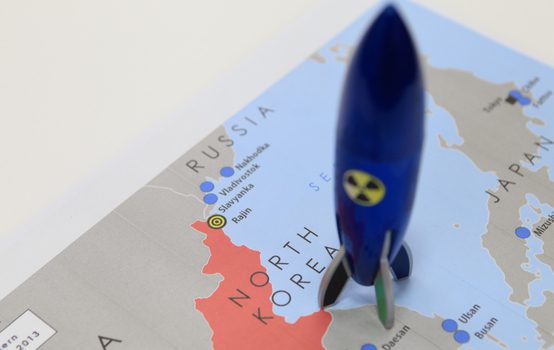A Blockade of North Korea Would Be Folly

James Stavridis proposes the genuinely awful idea of a naval blockade of North Korea as the “best option”:
The real challenge, of course, would be political, not operational. While North Korea will strenuously resist, it does not have the long-range targeting ability or enough combatant vessels to realistically challenge a blockade. But objections from both Russia and China, who certainly have the ability to confront a U.S.-led effort, would be a big hurdle. They might choose, for example, to disregard the blockade, escort North Korean and third-party ships through it, or even actively oppose it by challenging U.S. ships at sea.
The biggest downside of a naval blockade would be the possibility of an at-sea confrontation between U.S. and allied warships and those of either China or Russia. While there is a small chance of escalation as a result of such a confrontation, it seems unlikely to significantly escalate.
Imposing a blockade on another country is an act of war, so it would be a dangerously aggressive move on our part. The blockade wouldn’t be respected by at least two of North Korea’s immediate neighbors, and unless the U.S. is actually prepared to risk armed clashes with other major powers by seizing ships flying their flags the blockade is not going to be effective. If China and Russia don’t want to go to war with the U.S. over North Korea as Stavridis says, the U.S. also won’t be willing to risk war with one or both or them to maintain the blockade. It’s a risky bluff that will almost certainly be called early on. Absent U.N. authorization (which will never be forthcoming), a blockade would have no real legal justification. Without U.N. approval, we would find that our “coalition of the willing” would include very few other states.
The more practical problem with the idea of a blockade is that it would require a massive commitment from the Pacific fleet when the same fleet is arguably already overtaxed and spread too thin. The multiple collisions and accidents that have plagued the Seventh Fleet in just the last year suggest that it is already being asked to do more than it can. Imposing a naval blockade would add an enormous, costly burden that the U.S. doesn’t need. Stavridis claims that a blockade “presents an opportunity to throw the North Koreans off their stride and pinch their economy,” but it looks to me like a dangerous waste of limited U.S. resources in pursuit of an unrealistic goal.
Comments